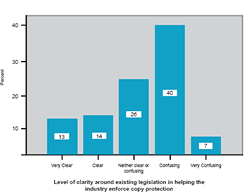 Macrovision, a company who sell content protection (DRM) system, have today released a report they commissioned into content copying.
Macrovision, a company who sell content protection (DRM) system, have today released a report they commissioned into content copying.
The findings? That ‘Casual Piracy’ is “a Growing Challenge in the Entertainment Industry” and that “mass market penetration of digital recording devices and broadband/file-sharing networks are prompting many entertainment brands to enrich their content protection strategies and influence bottom line performance.”
Let us translate. Digital Rights Management (DRM) is coming and the public had better start getting used to it.
 This is on the basis of what to us appears, from a quick once over of this report, a pretty unscientific approach, as the following paragraph from page 10 illustrates.
This is on the basis of what to us appears, from a quick once over of this report, a pretty unscientific approach, as the following paragraph from page 10 illustrates.
“In order to estimate exactly what effective content protection represents, respondents were also asked to estimate how many units/titles were copied (burnt) for each 100 sold and how many were illegally downloaded for every 100 sold.”
How can someone write “estimate exactly” without seeing the paradox? They just have well asked them “How paranoid are you about content copying?”
Their conclusion directly under this nonsense? “None of the figures make for comfortable reading.” WHAT?!?!? Just because these figures are presented in a table in a report with graphs next to them, doesn’t elevate them from what they are – guesses. At this point we stopped reading this report – we had some drying paint that needed watching.
 I hope that each time a ‘report’ or so called research like this is published, that it is gone through with a fine tooth comb pointing out its weaknesses. This kind of nonsense needs to be countered.
I hope that each time a ‘report’ or so called research like this is published, that it is gone through with a fine tooth comb pointing out its weaknesses. This kind of nonsense needs to be countered.
FUD rules
I have, for years, been questioning the content industry – How are you going to sell DRM to the public when what you’ll be selling them some less good/useful than they had before? The answer has always been a resounding silence.
When I asked a very senior person at Fox (his name escapes me) why DRM would be required when the vast majority of their customers are fair, reasonable and trustworthy, his response stunned me – “We take the opposite view, we treat everyone as dishonest.”
To me, that summed up both the arrogance and distain of the company, and possibly that of the current ‘entertainment’ industry. Any company that has such a low opinion of their customers, will eventually come to a sticky end – and it’s quite right that they do.
Through the sheer panic of suddenly waking up to the changes that technology has been bringing to media for decades (hell, I had digitised audio tracks on my Mac Plus, soon after it was released in 1984), the ‘entertainment;’ business has been listening to technology companies, who by strange co-incidence have something to sell – content protection systems.
That combined with the universal truth that fear is contagious, leads to a point where we are now. The current media companies being near terrified that _all_ of the customers are waiting to steal from them, so they must be restricted – and DRM-selling companies are more than happy to help them in their fear.
Their perceived need to restrict their customers is costing them _huge_ amounts of money and it will continue to … and to what gain?
They stop their customers from using their purchases how they feel fit – well, at least until the latest hack removes the protection – and in the process, further alienate their customers, building resentment.
Why don’t they spend all of this effort, time and money creating new content – engaging their audience further?
I wonder if the ‘entertainment’ companies have spared a thought as to what would happen if their businesses did fail? Do they not see that generally the technology companies are going to win anyway even without them?
PDF of complete report.
BTW, don’t try copying text out of the report, it’s protected unsurprisingly.